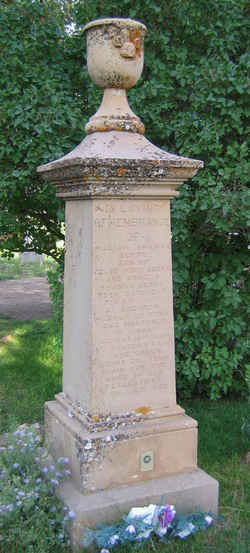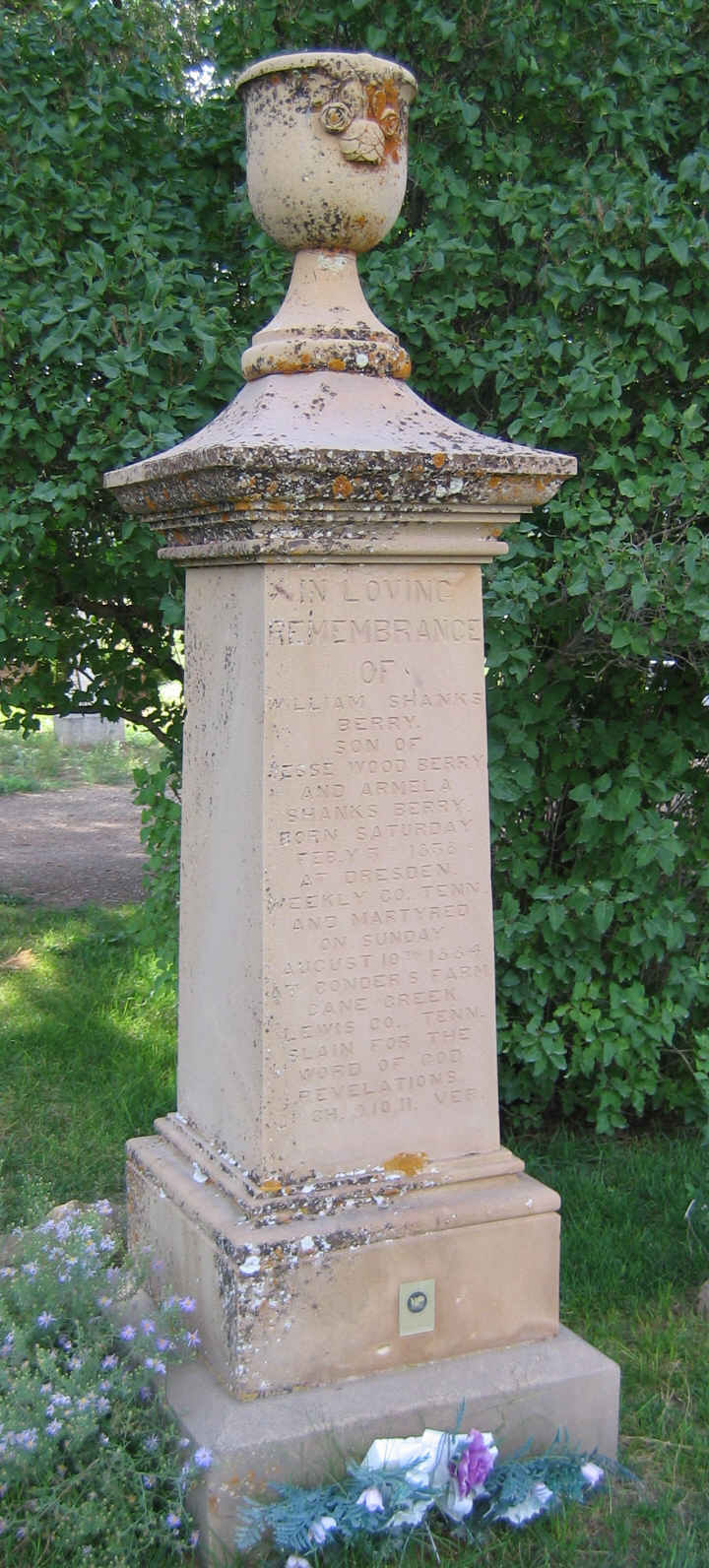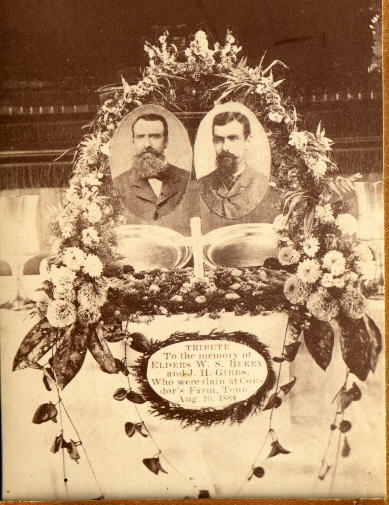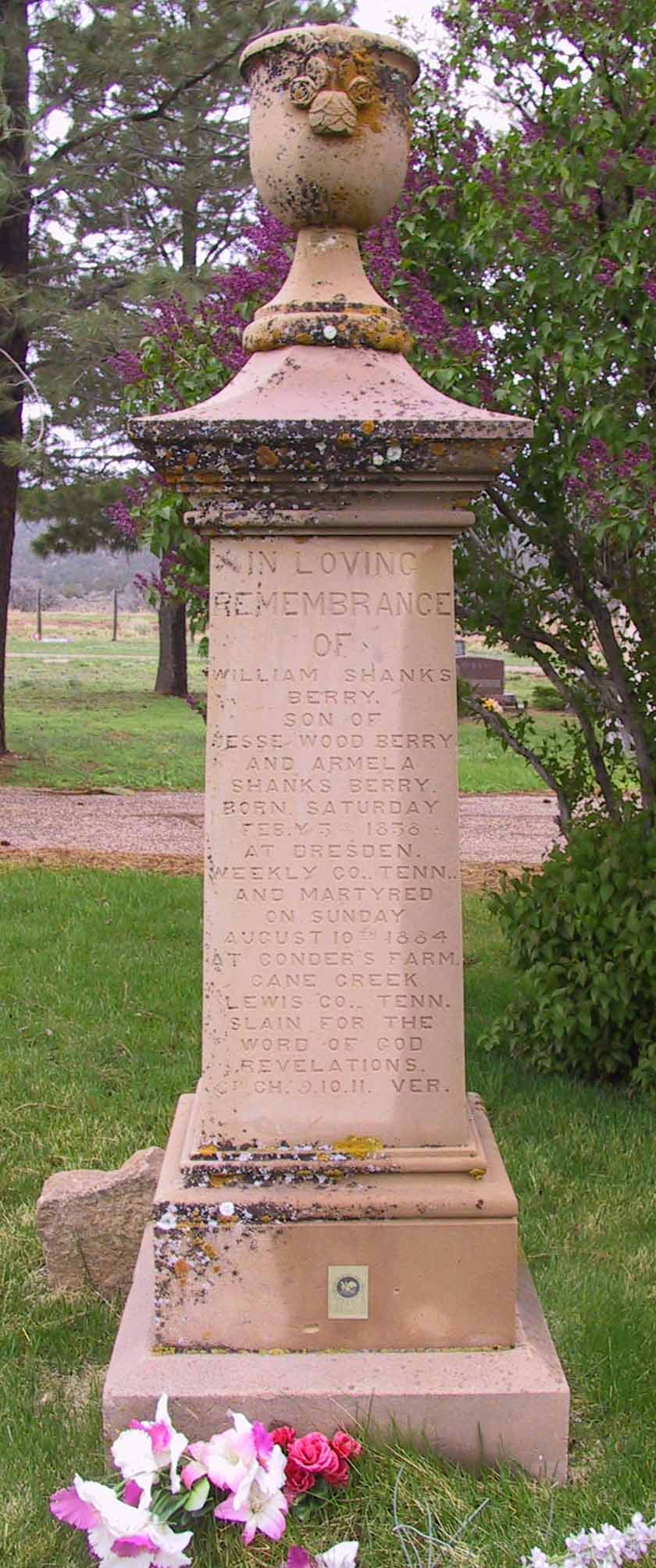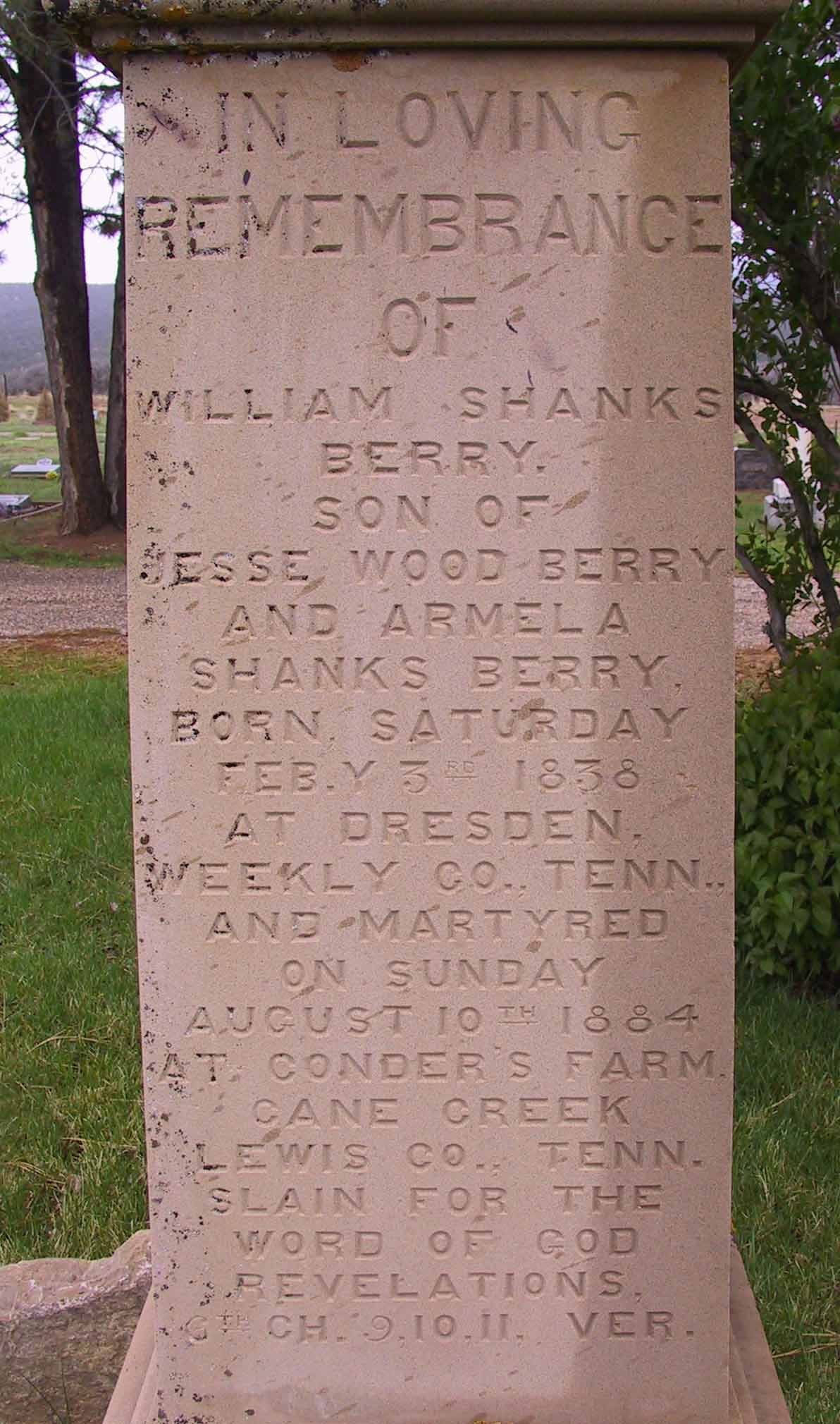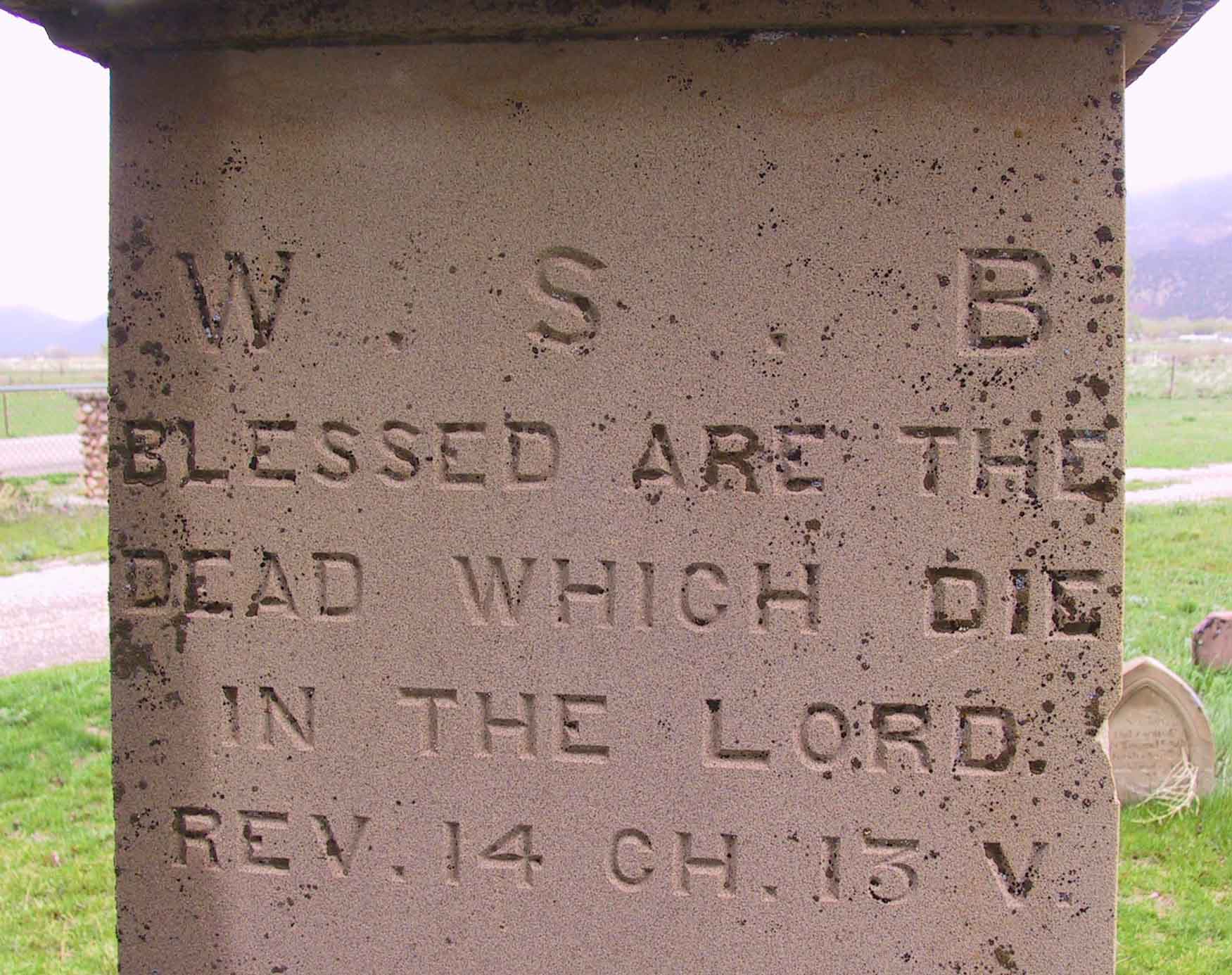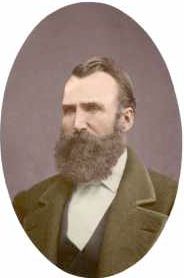William Shanks Berry was killed while on a mission for The Church of Jesus Christ of latter-day Saints by a mob in Tennessee on 10 Aug 1884.
Son of Jesse Woods Berry and Armelia Shanks
- He married Diantha Allen on 15 Oct 1864 in Salt Lake City, Salt Lake, Utah.
- He married Lovinia Nicholson Sylvester, on 22 Jun 1874 in Salt Lake City, Salt Lake, Utah.
- He married Rebecca Rocena Beck on 22 Nov 1860, in Spanish Fork, Utah, Utah.
Biography - William Shanks Berry, born February 3, 1838, to Jesse Woods Berry and Armelia or Amelia Shanks (Berry). The family was Tennesseans from so far back that their ancestors built the pigpens next to their log cabins to protect the pigs from the bears. His parents were among the first to accept Mormonism in that state. Later they moved to Nauvoo, Illinois where they helped build that beautiful city. Here, his father Jesse died leaving his mother with four sons and six daughters. 9 children came to Utah with their mother in the Mormon exodus.In the fall of 1865, Armelia and her sons Joseph, who was single, and Robert and his wife went to spend the winter with relatives in Spanish Fork and also to purchase seed grain. Late in March 1866 Joseph, Robert and his wife started home leaving Mother Berry still visiting with her married daughters. Because of the illness and death of Roberts child, they were delayed in departing with the company with whom they had intended to travel; consequently, they made the trip alone. On April 2, they reached Short Creek and were attacked by Indians. They did everything they could to defend themselves but tortured them to death by burning their eyes out with hot sticks and also shot them full of arrows. The brothers were tied to the wagon wheels, and the young wife, who was pregnant at the time with their first baby, was found dead in the wagon. William Berry, at home in Berryville knowing the brothers were on the road, grew anxious about them. He saddled his horse and rode out to meet them. Stopping at a grassy spot to let the horse feed, he knelt in prayer for their safety. As he did so, a vision was opened to him of their mutilated bodies lying in their ransacked wagon. Horrified, he quickly mounted and rode his horse for help. He soon met a friendly Indian who was coming to tell him about the tragedy. He sent the Indian on to Berryville to tell his brother, John, while he hurried on to Grafton for help. A posse was quickly organized to recover the bodies to bring them to Grafton where they were buried. Word was dispatched to settlers who were scattered throughout Southern Utah to gather into larger centers for protection. The Black Hawk War had reached the south and the Indians were on a rampage. Berryville was abandoned and no one lived there for a long time after. When the area was again settled the name was changed from Berryville to Glendale. William tried to find the Indians who killed his family and he thought he knew who they were. The story is told that William found 2 Indians in a log cabin and was sure he was one of those who had killed his family. With one Indian backed against the wall and the point of a butcher knife pricking his bare abdomen, William tried to make him tell what he knew. When the Indian said that he was one of the guilty party, William could hardly restrain himself, and he felt that if he killed the Indian it would settle the score. Then the Indian did a brave thing that brought William to his senses, he calmly folded his arms, looked William straight in the eye, and stood solid. He spoke no word and for a moment the 2 stood staring at each other. At this time it was made known to William that vengeance was the Lord's and that he wouldn't want the blood of any man on his hands. So he told the Indian to get out. The incident taught William a lesson in self-control which he would never forget. William and John, the 2 surviving brothers moved to Kanaraville in 1866 where they lived for some time in the fort. When the Indian troubles subsided, they built a brick home and Kanarra became the Ancestral home of the Berry's. In the years that followed, William and John became outstanding men in Iron County. They were influential, progressive, and industrious citizens, and faithful churchmen. William was a member of the bishopric and both were leaders in developing the livestock business. They were among the first to import purebred sires into Iron County. William was the president of the Kanarraville Co-op Stock Herds up to the time of his death. He married Lovinia Nicholson Sylvester as a plural wife and they had 5 children together, one being born 6 weeks after he left for a mission. They made their home in Kanarra, Utah. He was called on a mission in 1884 to the Southern states having been born in Tennessee and knew a lot of people in the area. He traveled considerably over the state renewing acquaintances and making friends for the church among the state and city officials and prominent businessmen. He did this as part of his missionary assignment to break down the prejudices that existed against the Mormon Church. In this, he had a large measure of success. He had not been gone long when he had a dream that bothered him. He felt that something bad would happen back home, so he wrote Lovinia and told her to tell the girls to keep off the horses. The letter seemed sad. He had been gone just over 4 months when he was killed. In 1884, he was killed in Tennessee along with 5 other men while on a mission for the LDS Church. It was known as the Mormon Massacre. He had been preaching in Lewis County when a mob opened fire at James Condor's home (where he had been preaching) in Cane Creek. B.H. Roberts, President of the Southern States Mission, had to disguise himself as a ruffian to go get the bodies at the Condor Farm because the mobsters were guarding the road to the farm, fearing vengeance. He shipped the bodies home to their families in metal caskets. The bodies were taken to the Tabernacle in Salt Lake City where a service was held in their honor with the building being filled. At every railroad station along the way, people gathered to pay respects to the Elders. There is a story that when the mob was coming to find the bodies when they came to a fork in the road going to the Condor Farm and one going on past- they couldn't control the horses and they took the road which bypassed the farm. Therefore, Brother Roberts was able to take the bodies safely by wagon to the train station. Four of William Berry's grandfathers had fought in the American Revolution to establish freedom of worship in America, and his father was a soldier for his country in the War of 1812. On that fatal August Sabbath day, hatred and religious intolerance uprooted liberty and justice and trampled them into the dust of Tennessee. After the martyrdom of Brother Berry and his companion, the area in Tennessee was closed to proselyting until a few years ago. It is interesting to note that one of the first missionaries called to open that area again was Kyle Wilson, (whose father is Karl Wilson and a grandson of Kent Webb Wilson, son of Amelia Webb Wilson) is a great, great, great Grandson of William S. Berry. Another missionary called was a great, great, great-granddaughter of his companion, Elder Gibbs. She was called as a sister missionary to prepare this area to open again.
William Shanks Berry was killed while on a mission for The Church of Jesus Christ of latter-day Saints by a mob in Tennessee on 10 Aug 1884.
Son of Jesse Woods Berry and Armelia Shanks
- He married Diantha Allen on 15 Oct 1864 in Salt Lake City, Salt Lake, Utah.
- He married Lovinia Nicholson Sylvester, on 22 Jun 1874 in Salt Lake City, Salt Lake, Utah.
- He married Rebecca Rocena Beck on 22 Nov 1860, in Spanish Fork, Utah, Utah.
Biography - William Shanks Berry, born February 3, 1838, to Jesse Woods Berry and Armelia or Amelia Shanks (Berry). The family was Tennesseans from so far back that their ancestors built the pigpens next to their log cabins to protect the pigs from the bears. His parents were among the first to accept Mormonism in that state. Later they moved to Nauvoo, Illinois where they helped build that beautiful city. Here, his father Jesse died leaving his mother with four sons and six daughters. 9 children came to Utah with their mother in the Mormon exodus.In the fall of 1865, Armelia and her sons Joseph, who was single, and Robert and his wife went to spend the winter with relatives in Spanish Fork and also to purchase seed grain. Late in March 1866 Joseph, Robert and his wife started home leaving Mother Berry still visiting with her married daughters. Because of the illness and death of Roberts child, they were delayed in departing with the company with whom they had intended to travel; consequently, they made the trip alone. On April 2, they reached Short Creek and were attacked by Indians. They did everything they could to defend themselves but tortured them to death by burning their eyes out with hot sticks and also shot them full of arrows. The brothers were tied to the wagon wheels, and the young wife, who was pregnant at the time with their first baby, was found dead in the wagon. William Berry, at home in Berryville knowing the brothers were on the road, grew anxious about them. He saddled his horse and rode out to meet them. Stopping at a grassy spot to let the horse feed, he knelt in prayer for their safety. As he did so, a vision was opened to him of their mutilated bodies lying in their ransacked wagon. Horrified, he quickly mounted and rode his horse for help. He soon met a friendly Indian who was coming to tell him about the tragedy. He sent the Indian on to Berryville to tell his brother, John, while he hurried on to Grafton for help. A posse was quickly organized to recover the bodies to bring them to Grafton where they were buried. Word was dispatched to settlers who were scattered throughout Southern Utah to gather into larger centers for protection. The Black Hawk War had reached the south and the Indians were on a rampage. Berryville was abandoned and no one lived there for a long time after. When the area was again settled the name was changed from Berryville to Glendale. William tried to find the Indians who killed his family and he thought he knew who they were. The story is told that William found 2 Indians in a log cabin and was sure he was one of those who had killed his family. With one Indian backed against the wall and the point of a butcher knife pricking his bare abdomen, William tried to make him tell what he knew. When the Indian said that he was one of the guilty party, William could hardly restrain himself, and he felt that if he killed the Indian it would settle the score. Then the Indian did a brave thing that brought William to his senses, he calmly folded his arms, looked William straight in the eye, and stood solid. He spoke no word and for a moment the 2 stood staring at each other. At this time it was made known to William that vengeance was the Lord's and that he wouldn't want the blood of any man on his hands. So he told the Indian to get out. The incident taught William a lesson in self-control which he would never forget. William and John, the 2 surviving brothers moved to Kanaraville in 1866 where they lived for some time in the fort. When the Indian troubles subsided, they built a brick home and Kanarra became the Ancestral home of the Berry's. In the years that followed, William and John became outstanding men in Iron County. They were influential, progressive, and industrious citizens, and faithful churchmen. William was a member of the bishopric and both were leaders in developing the livestock business. They were among the first to import purebred sires into Iron County. William was the president of the Kanarraville Co-op Stock Herds up to the time of his death. He married Lovinia Nicholson Sylvester as a plural wife and they had 5 children together, one being born 6 weeks after he left for a mission. They made their home in Kanarra, Utah. He was called on a mission in 1884 to the Southern states having been born in Tennessee and knew a lot of people in the area. He traveled considerably over the state renewing acquaintances and making friends for the church among the state and city officials and prominent businessmen. He did this as part of his missionary assignment to break down the prejudices that existed against the Mormon Church. In this, he had a large measure of success. He had not been gone long when he had a dream that bothered him. He felt that something bad would happen back home, so he wrote Lovinia and told her to tell the girls to keep off the horses. The letter seemed sad. He had been gone just over 4 months when he was killed. In 1884, he was killed in Tennessee along with 5 other men while on a mission for the LDS Church. It was known as the Mormon Massacre. He had been preaching in Lewis County when a mob opened fire at James Condor's home (where he had been preaching) in Cane Creek. B.H. Roberts, President of the Southern States Mission, had to disguise himself as a ruffian to go get the bodies at the Condor Farm because the mobsters were guarding the road to the farm, fearing vengeance. He shipped the bodies home to their families in metal caskets. The bodies were taken to the Tabernacle in Salt Lake City where a service was held in their honor with the building being filled. At every railroad station along the way, people gathered to pay respects to the Elders. There is a story that when the mob was coming to find the bodies when they came to a fork in the road going to the Condor Farm and one going on past- they couldn't control the horses and they took the road which bypassed the farm. Therefore, Brother Roberts was able to take the bodies safely by wagon to the train station. Four of William Berry's grandfathers had fought in the American Revolution to establish freedom of worship in America, and his father was a soldier for his country in the War of 1812. On that fatal August Sabbath day, hatred and religious intolerance uprooted liberty and justice and trampled them into the dust of Tennessee. After the martyrdom of Brother Berry and his companion, the area in Tennessee was closed to proselyting until a few years ago. It is interesting to note that one of the first missionaries called to open that area again was Kyle Wilson, (whose father is Karl Wilson and a grandson of Kent Webb Wilson, son of Amelia Webb Wilson) is a great, great, great Grandson of William S. Berry. Another missionary called was a great, great, great-granddaughter of his companion, Elder Gibbs. She was called as a sister missionary to prepare this area to open again.
Gravesite Details
Died Condor's Farm, Cane Creek, Lewis, Tennessee.
Family Members
-
Adeline P. Berry Jones
1821–1859
-
![]()
John Williams Berry
1822–1890
-
![]()
Martha Elizabeth Berry Dorrity
1827–1885
-
![]()
Louisa Jane Berry Allen
1828–1902
-
![]()
Harriet Armelia Berry Mulliner
1831–1884
-
![]()
Cynthia Lovina Berry Gardner
1833–1918
-
![]()
Thirza Melvina Berry Thurber
1836–1900
-
![]()
Robert Madison Berry
1841–1866
-
![]()
Joseph Smith Berry
1843–1866
-
![]()
William Alfred Berry
1861–1861
-
![]()
Armelia Rebecca Berry Taylor
1863–1946
-
![]()
Hannah Margaret Berry Williams
1865–1932
-
![]()
Harriet Louisa Berry Stapley
1867–1948
-
![]()
Lucilla Diantha Berry Williams
1870–1930
-
![]()
Rocena Adaline Berry
1873–1873
-
![]()
Mary Wilhelmina Berry Platt
1874–1960
-
![]()
James Sylvester Berry
1875–1963
-
![]()
Jesse Arthur Berry
1877–1927
-
![]()
John William Berry
1877–1928
-
![]()
Althea Rebecca Berry Adams
1879–1944
-
![]()
Ella Eleanor Berry Leigh
1879–1980
-
![]()
Emma Lovinia Berry Webb
1881–1963
-
![]()
Minnie Malvina Berry Rowe
1883–1979
-
![]()
William Andrew Berry
1884–1924
Advertisement
Records on Ancestry
Sponsored by Ancestry
Advertisement
